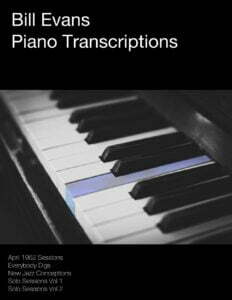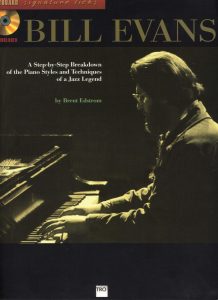Bill Evans – Live in Switzerland (1975 Album)
Bill Evans – Live in Switzerland (1975 Album)
Browse in the Library:
This LP comes from a live 1975 concert by the Bill Evans Trio, which was broadcast by Radio Suisse in Switzerland. The pianist is in superb form, joined by longtime bassist Eddie Gomez and newcomer Eliot Zigmund on drums.
The sound is excellent, without the annoying announcers or distortion, so this release could have very well been produced from the master tape itself. The set is wide-ranging, including both recent and older compositions by Evans, “Gloria’s Step” (the best-known work by former Evans sideman Scott LaFaro, who died far too young), along with standards like a buoyant “My Romance.
” The leader’s treatment of his ballad “Turn Out the Stars” is rather upbeat, while his somewhat avant-garde composition “T.T.T.T.” (also known as “Twelve Tone Tune Two”) is a modern masterpiece. Perhaps the greatest surprise was Evans‘ inventive treatment of pop singer Bobbie Gentry‘s “Morning Glory.”

This CD comes from a live 1975 concert by the Bill Evans Trio, which was broadcast by Radio Suisse in Switzerland. The pianist is in superb form, joined by longtime bassist Eddie Gomez and newcomer Eliot Zigmund on drums.
The sound is excellent, without the annoying announcers or distortion, so this release could have very well been produced from the master tape itself. The set is wide-ranging, including both recent and older compositions by Evans, “Gloria’s Step” (the best known work by former Evans sideman Scott LaFaro, who died far too young), along with standards like a buoyant “My Romance.”
The leader’s treatment of his ballad “Turn Out the Stars” is rather upbeat, while his somewhat avant-garde composition “T.T.T.T.” (also known as “Twelve Tone Tune Two”) is a modern masterpiece. Perhaps the greatest surprise was Evans’ inventive treatment of pop singer Bobbie Gentry’s “Morning Glory.”
The only real problem with this CD is the sloppy composer credits on two numbers. This 1990 release may be somewhat difficult to find, but it is one of the better bootlegs issued under Bill Evans’ name. — Ken Dryden, Rovi.
01 Sugar Plum 07:27 02 Midnight Mood 08:23 03 Turn Out The Stars 04:56 04 Gloria's Step 07:09 05 Up With The Lark 06:19 06 Twelve Toned Tune 07:10 07 Morning Glory 04:25 08 Sareen Jurer 06:59 09 Time Remembered 05:38 10 My Romance 07:54 11 Waltz For Debby 05:58 12 Yesterday I Heard The Rain 05:42 Bill Evans, piano Eddie Gomez, bass Eliot Zigmund, drums Epalinges, Switzerland, 6th February 1975

Bill Evans was on an upswing in 1968. There had been tragedy and depression and demons to bear, but the jazz pianist had made his way forward over the previous few years. He had collaborated fruitfully with such peers as Jim Hall, gained a devoted new manager, signed with the high-profile Verve label, and won his first Grammy Award.
Bill Evans had also developed rapport with a virtuoso young bassist, Eddie Gomez, and they eventually added an up-and-coming force of a drummer, Jack DeJohnette, for a new trio — one that seemed to hold a dynamic promise that the pianist’s groups hadn’t quite shown since his famously inspired trio with drummer Paul Motian and short-lived bassist Scott LaFaro in 1959–61.
A European tour by Evans, Gomez, and DeJohnette in the summer of ’68 would yield an ebullient live album, At the Montreux Jazz Festival, that garnered the pianist his second Grammy. Then Miles Davis broke up the band.
That is, Davis lured DeJohnette away to his own group. Evans could scarcely blame the drummer for leaving him to join the era’s most iconic jazz bandleader. After all, the pianist had made his own name as the trumpeter’s kindred-spirit collaborator on Kind of Blue, the LP that would turn on more people to jazz than any in music history. (DeJohnette would end up playing on Davis’s Bitches Brew, an album almost as epochal for the late sixties as Kind of Blue was for the late fifties.)
But it seemed like a missed opportunity, as the Evans trio with DeJohnette and Gomez, having been together for just six months, was only able to make that one live recording, nothing in the studio. Or at least that’s the way the story went until 2016, when Resonance Records released Some Other Time: The Lost Session from the Black Forest, a two-disc set derived from impromptu recordings made by the trio in a German studio just five days after that celebrated Montreux concert.
For reasons not quite clear, the recordings had never been issued before Resonance’s sleuthing. But all’s well that ends well, at least for today’s Bill Evans fans.
Then lightning struck twice. Last year, Resonance followed up Some Other Time by releasing a second, contemporaneous discovery: Another Time: The Hilversum Concert, which presents a pristine recording of Evans, Gomez, and DeJohnette performing for an audience in the intimate hall of the Netherlands Radio Union, just two days after that studio session in Germany. Moreover, the set list for that Dutch broadcast recording only features two numbers in common with the Montreux concert from the week before. Suddenly, we have two valuable “new” albums — recordings never even bootlegged before — by one of the most beloved and widely influential pianists in the annals of jazz.
“Bill Evans has shaped the harmony of every jazz pianist of the past fifty years, whether they want to admit it or not — because even if they didn’t listen to Bill, they listened to players who did listen to him, from Herbie Hancock on down,” says ace jazz pianist Frank Kimbrough, who teaches at the Juilliard School. “And for the public, the beauty of his music, particularly his early work, has always been accessible — easy to listen to, even if it isn’t ‘easy listening.’”
Download Bill Evans’ transcriptions sheet music from our online Library.

